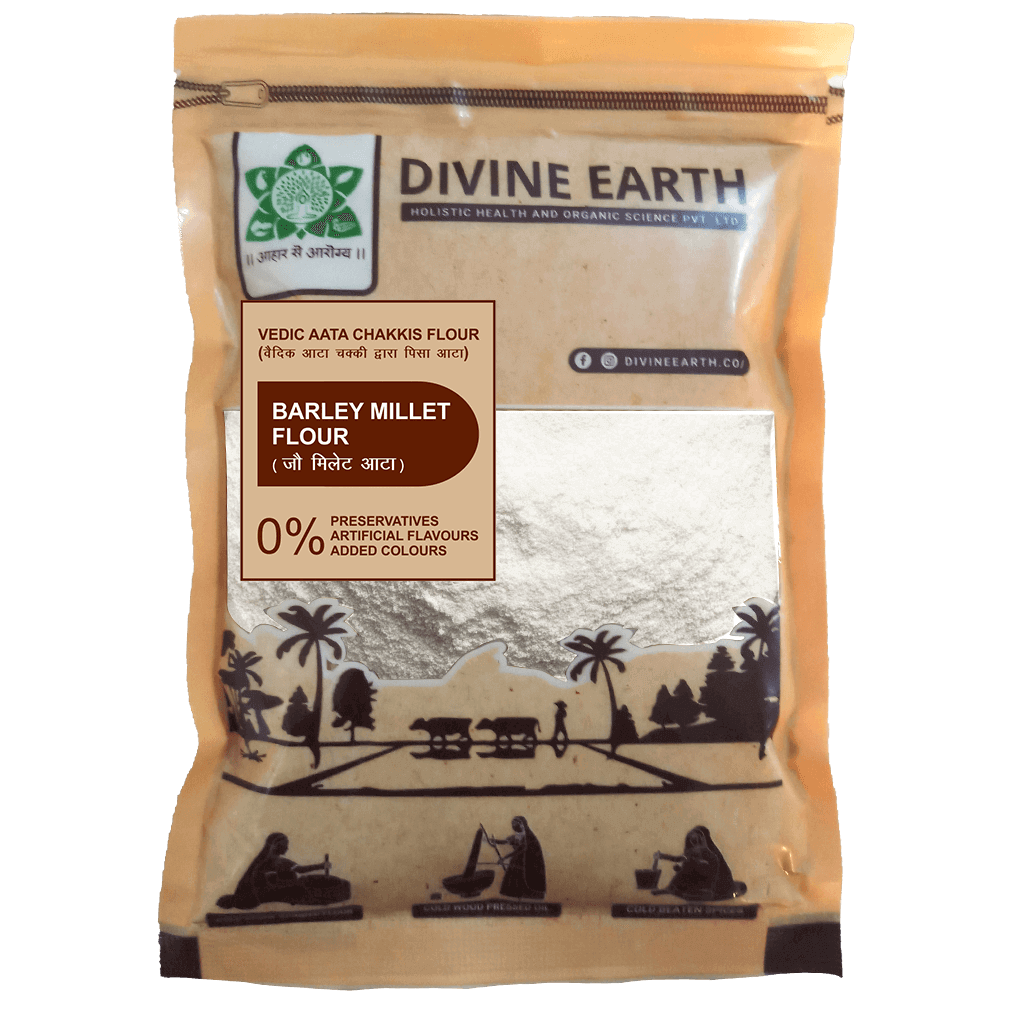BAJRA MILLET FLOUR – 500 GM
Original price was: ₹45.0.₹36.0Current price is: ₹36.0.
Divine Earth strongly recommends the use of our ancient forgotten grains i.e Millets (kodo, foxtail, barnyard, browntop, little , jowar , bajra , ragi etc) as staple diet instead of other grains. Millets are highly nutritious gluten free grains , which have high dietary fibre and better macro & micro nutrient profile as compared to wheat & rice. Additonaly millets require very little or no use of chemical fertilizers & pesticides hence one say millets are naturally organic. Further Divine Earth reommeds 5 positive vedic millets – FOXTAIL /BROWNTOP/LITTLE/BARNYARD/KODO for regular use as they have highest fibre content as compared to other grains & have therapeutic properties. डिवाइन अर्थ आपको हमारे प्राचीन भूले बिसरे अनाज यानि मिल्लेट्स को अपने दैनिक खानपान का हिस्सा बनाने के लिए प्रेरित करना चाहता है। मिल्लेट्स जैसे -कंगनी, छोटी कंगनी , कोदो , कुटकी , भगार , जोवार, बाजरा , रागी इत्यादि। मिल्लेट्स कुदरती रूप से ग्लूटेन मुक्त होते है। तथा इनमे फाइबर एवं पोषण की मात्रा गेहू और चावल से कही ज्यादा होता है। इसके अलावा मिल्लेट्स लगभग न के बराबर चेमिकल्स और फर्टीलिज़ेर्स के बिना पैदा किए जाते है इसलिए हम इन्हे कुदरती रूप से जैविक मन सकते है। अंत में हम आपको 5 पॉजिटिव वैदिक मिल्लेट्स जो की कोदो , कुटकी , कंगनी , छोटी कंगनी , भगर के भरपूर इस्तेमाल की सलाह देते है क्यूंकि इनमे सबसे ज्यादा फाइबर और औषदीय गुण होते है।
- Description
- Additional information
- Reviews (0)
- Q & A
- Sustainability Remark
- More Offers
- Store Policies
- Inquiries
| Weight | 1 kg, 500 grams |
|---|
You must be logged in to post a review.
Q & A
Environmental Benefits:
- Reduced greenhouse gas emissions: Beans and pulses are nitrogen-fixing crops that improve soil fertility and reduce the need for synthetic fertilizers, which contribute to greenhouse gas emissions.
- Water conservation: Compared to many other crops, beans and pulses generally require less water for cultivation, making them more water-efficient.
- Reduced pesticide use: Organic atta is made from organically grown grains, which means they are cultivated without the use of synthetic pesticides or genetically modified organisms, thus reducing the environmental impact of chemical inputs.
Biodiversity Conservation:
- Crop rotation: Beans and pulses are often part of crop rotation systems, which help break disease cycles, improve soil health, and enhance biodiversity on farms.
- Habitat preservation: Organic farming practices, including the cultivation of beans, pulses, and grains for atta, typically promote the preservation of natural habitats, supporting diverse ecosystems.
Soil Health:
- Nitrogen fixation: Beans and pulses have a symbiotic relationship with nitrogen-fixing bacteria, which convert atmospheric nitrogen into a form that plants can use, enriching the soil with nitrogen and reducing the need for synthetic fertilizers.
- Organic matter and carbon sequestration: Leguminous crops like beans and pulses contribute to soil organic matter, enhancing soil structure, water-holding capacity, and carbon sequestration.
Health and Nutrition:
- Nutrient-rich: Beans and pulses are excellent sources of plant-based proteins, dietary fiber, vitamins, and minerals, contributing to a balanced and nutritious diet.
- Reduced chemical exposure: Organic atta made from grains cultivated without synthetic pesticides reduces the risk of chemical residues in the final product.
To maximize the sustainability benefits of beans, pulses, and organic atta, it is important to consider factors such as responsible sourcing, efficient supply chains, reduced food waste, and supporting local and small-scale farmers who adopt sustainable practices.
General Inquiries
There are no inquiries yet.



Reviews
There are no reviews yet.